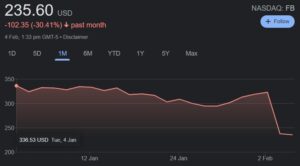why facebook down on market
Facebook down 26% on stock Market
The following chart shows the big facebook down on the stock market for 5m

What is Facebook?
Facebook is an online social media and networking website that allows its registered users to create profiles, upload photos and videos, send messages and keep in touch with friends, family and colleagues.
Facebook, along with its family of apps including Instagram and WhatsApp, faced a six-hour-long outage on Monday, rendering inaccessible the services that the world’s largest social media network offers to billions of its users.
The disruption was due to faulty configuration changes made to Facebook’s routers, the company said, but researchers have pinpointed the reason for Facebook’s outage to issues with something called a Border Gateway Protocol (BGP).
Facebook Down, Impact in India
Facebook’s ‘Big Blue’ social network has more than 2.8 billion users globally, while WhatsApp has 2 billion users and Instagram too has over 1 billion users today.
India is home to the largest user base for several of these apps: Facebook has 410 million users in India, WhatsApp 530 million and Instagram 210 million.
A large number of local businesses are reliant on Facebook’s services, and outages do not augur well for them.
For instance, India has services like Meesho, where sellers rely heavily on communication through platforms such as WhatsApp—a driving force behind Facebook’s investment in the firm.
Facebook is also leaning more heavily into products that generate less revenue in the short term but that executives believe have large growth potential, like Reels on Instagram. The company’s core social media business, reported under its Family of Apps, made $32.79 billion in revenue in the quarter with an operating income of $15.89 billion.
Meta broke out its Reality Labs segment for the first time, comprising its future-focused business that aims to develop the metaverse. The segment made $877 million in revenue in the fourth quarter with an operating loss of $3.3 billion. The segment lost $10 billion last year, and those losses are growing as it bets on the metaverse.
Apple’s message seems simpler.
Apple’s view is that it’s simply giving people a choice of whether to be tracked across apps or not. Facebook’s argument to the public is more complex — than they have to be tracked for the internet to work, and that people don’t know what’s good for them
Starting on Monday, people with iPhones will begin to see pop-up messages on their screens asking whether they will permit companies to follow them from app to app.
Currently, Facebook and companies like it track the ways people use their phones, picking up bits of information such as how often they open their yoga app and what they buy at Target. Facebook then uses that information to help companies target their ads.
Apple says that it wants people to have a choice about participating in this information-harvesting system. Facebook says these ads help make the internet free for all.
“People can’t really be targeted the way they were before,” said Eric Seufert, a media strategist and author of Mobile Dev Memo, a blog about mobile advertising. “That breaks the model. It’s not just an inconvenience that can be fixed with a couple of tweaks. It requires rebuilding the foundation of the business.”
Other internet companies that depend on ads felt the tremors, too. But smaller outfits appear to have been more nimble than Meta in their response to Apple’s changes.
Apple made significant changes to the privacy settings of its mobile operating system last year, allowing iPhone users to choose whether advertisers could track them. Since Apple introduced the feature, a vast majority of iPhone users have opted to block tracking.
Only 24 percent of iPhone users around the world have consented to be tracked by advertisers, according to data published in December by the analytics company Flurry.
The Facebook Outage
There are conflicting accounts about the severity of this outage. Many critics claim that the Facebook outage went on for as long as 22 hours. However, most reliable sources seem to agree that most of Facebook’s network was fully functional within 14 hours.
Also, there is debate whether this outage was faced all across the globe. However, Facebook has stated that its services were affected only in some parts of the globe, i.e. the downtime was not the same all across the globe.
Questions have also been raised about whether this is some sort of an attack by hackers and whether Facebook has relevant systems in place in order to defend against such attacks. Up until now, Facebook has remained tight-lipped about the root cause of this attack. At the present moment, it is more focused on ensuring that the services continue to function seamlessly.
The Lost Revenue
The revenue impact of this outage is difficult to ascertain. However, even if last year’s numbers are simply extrapolated, Facebook seems to have lost a lot of money. According to the last year’s figures released by Facebook, the company earns around $56 billion per annum in revenues. Hence, its hourly revenue can be considered to be close to $6.5 million. Given that the services were down for close to 14 hours, the loss can be put somewhere in the ballpark of $90 million.